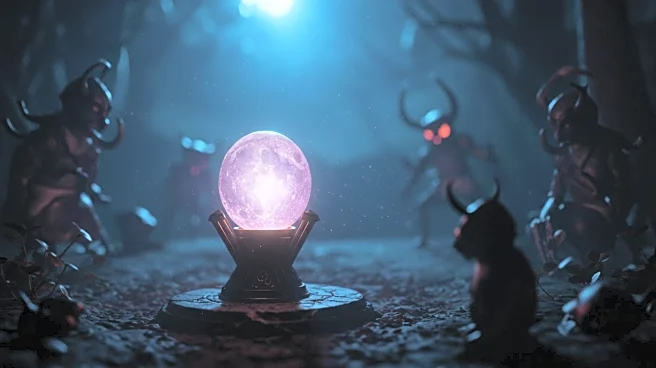What is the story about?
What's Happening?
The animated film 'KPop Demon Hunters' has become a significant hit, topping the Billboard Hot 100 with its single 'Golden' and amassing over 184 million views on Netflix. The film features a fictional K-pop girl group, Huntr/x, who secretly battle demons while maintaining their glamorous pop star personas. The characters, voiced by Arden Cho, May Hong, and Ji-young Yoo, have resonated with audiences, particularly young girls, due to their relatable off-stage moments and the film's attention to detail. The film explores themes of self-acceptance, as seen through the character Rumi, who learns to embrace her half-demon identity.
Why It's Important?
The success of 'KPop Demon Hunters' highlights the growing influence of K-pop culture in global entertainment and its ability to address universal themes such as self-acceptance and identity. The film's popularity among diverse audiences suggests a broad appeal for stories that blend fantasy with relatable human experiences. This success could encourage more productions that incorporate cultural elements and address social issues, potentially impacting how animated films are developed and marketed. The film's message of self-acceptance resonates with viewers, offering a positive representation that can inspire discussions on identity and belonging.
What's Next?
While a sequel has not been officially confirmed, the film's success and open-ended storyline suggest that further developments are likely. The creators have expressed interest in exploring new adventures for the characters, including a potential storyline to 'rescue Jinu.' Additionally, there is hope for a real-life performance by the singing voices of Huntr/x at the Oscars, which could further elevate the film's cultural impact. Fans and creators alike are eager to see how the story will continue and what new themes will be explored in future installments.
Beyond the Headlines
The film's exploration of identity and self-acceptance through the character Rumi has sparked discussions among fans, with some interpreting it as a metaphor for various personal struggles, including queerness. This highlights the film's ability to connect with audiences on a deeper level, offering a platform for viewers to see their own experiences reflected in popular media. The universal appeal of the film's message underscores the importance of inclusive storytelling in entertainment, which can foster empathy and understanding across different cultural and social backgrounds.
















